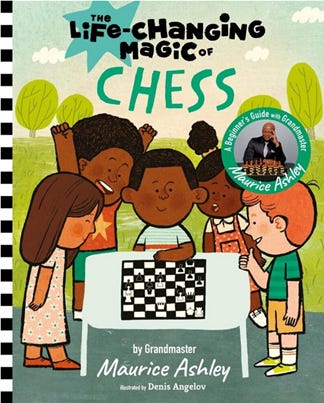The best new writing and the greatest classics under one roof … in association with Forward Chess
‘Chess is a game for everybody, no matter who you are, where you come from or what your circumstances are.’
Maurice Ashley – The Life-Changing Magic of Chess
This month, in a first for this column, we talk with the author of the book we are reviewing. It was wonderful to hear directly from the world’s first African-American grandmaster, Maurice Ashley, on The Life-Changing Magic of Chess.
I began by asking Maurice what had inspired him to write this book.
Maurice said: ‘I was approached by Magic Cat to write The Life-Changing Magic of Chess, and I instantly became very intrigued by the idea. It’s one of those things where you don’t realize there’s something you want to do until you’ve been asked to do it. I feel very satisfied that I got to write exactly this book, since one of my most important missions in life is to inspire young people to follow their dreams.’
I noted that The Life-Changing Magic of Chess was very strong on the possibilities the game can offer away from the sixty-four squares in terms of building friendships and opportunities to travel. I asked Maurice to say a little more on this.
Maurice said: ‘I am amazed and grateful for the number of friends that I’ve made and the places I’ve been to because of chess. The game has also taught me many life lessons, from using losses as a way to grow, recognizing the genius in even your greatest adversary, and keeping a beginner’s mindset despite having reached the grandmaster title. Even today I am still learning so much about chess, and my wish is that the book communicates my love and passion for the game to kids.’
Finally, I asked Maurice a more general question that I felt was important. It had struck me that Maurice’s book would help to welcome many new players to the game. As the world's first African-American GM Maurice is clearly an amazing role model. He has described this achievement as ‘both mattering and not mattering’. I wondered what he meant by this, and what he felt the game needed to do to become more inclusive?
Maurice said: ‘Diversity is a law of the universe, and the game of chess has always thrived on having people from all backgrounds picking it up and adding their special flavour and creativity to the sport. Imagine if chess had never made it to the people of Cuba or the Philippines, then there would have never been a Capablanca or Wesley So. While it shouldn't matter what you look like or what your skin colour is, I believe it's our collective responsibility to ensure that kids from all cultures have a chance to rise to the top of our game. It's one of the greatest powers of chess that it continues to break down all barriers and bring in new fans from all over the world.’
In terms of The Life-Changing Magic of Chess itself, I thought this was a beautifully put together and heart-warming offering. Maurice manages to combine elements of both his own story with thoughts on players who have inspired him, and a helpful beginners guide to the game.
In ten simple chapters, Maurice covers topics ranging from ‘It’s like being a magician’ and ‘Everyone starts as a beginner!’ through to ‘Everybody is welcome’, ‘Losing is learning’ and ‘What happens in your life can help you in chess’. All of which is likely both to give beginners some basic tips, and to encourage them to take further steps into the chess world.
Maurice’s journey from Jamaica to Brooklyn, and from beginner to serious player, is very well captured. His characterisation of watching the players in Prospect Park is a perfect illustration of his ability to convey a lot in very few words. ‘And their game was lightning-fast, using a clock to time the moves. I couldn’t take my eyes off their hands, flitting like a hummingbird’s wings as they moved piece after piece.’
We get a real sense throughout the book of the extent to which chess has taken Maurice on a magical life-long adventure. Moreover, while most readers of this book aren’t going to become grandmasters, where Maurice excels is in sharing a sense that chess can open up possibilities in anyone’s life. We should also give a shout-out to Denis Angelov, whose lovely illustrations perfectly complement Maurice’s excellent writing. This is a very nicely put together work.
It is only fair to highlight that this is not a detailed guide to the mechanics of the game. From a technical perspective, other books will be needed for a learner to build their knowledge. Indeed, Richard James’s Chess Heroes series, which I reviewed last month, might be a logical next step. However, relaying reams of theory is not the main point of Maurice’s book. Rather it is to inspire, to tell a story, to create an imaginative spark that might light a fire which lasts a lifetime. It hugely succeeds on all these fronts.
Without question The Life-Changing Magic of Chess would make a very nice present to a child, and could well be a first important step on a very special journey. Maurice Ashley continues to break down barriers and to welcome others to the game that has given him so much. The Life-Changing Magic of Chess is yet another example of Maurice Ashley giving back, and then some.




